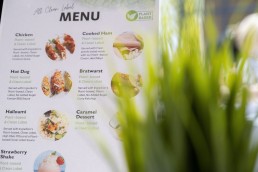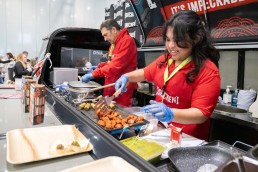Plant Based World Expo 2024 in London
On 13-14 November 2024, SCA was at the Plant Based World Expo Europe in London. The future of plant-based food is not in 2030 or 2050. It’s now.
But sure, there are challenges. For example, in cultivated meat — once far too expensive to buy, but now closer than ever to reaching home plates. During the panel discussion about this subject with Riley Jackson, Billy Nicholles, Joseph Saine, and Annie Conde, they discussed complexities with regulations, including those around building plants. In the UK, procedures can take around 2 years, while in Europe, it may take even up to 4–5 years. Moreover, costs need to be monitored better, as this is where things have regularly gone wrong in the past. It’s still early days, but the market is developing.
On the second day, another discussion focused on dairy. The panel, moderated by Indy Kaur, included Mitch Lee 🧀, Tim Knight, Helen Hartley, and Ali Morpeth (RNutr). There is a lot of misinformation in this sector, including claims that the nutritional value is not the same as regular milk. Nonetheless, the market for plant-based milk is developing at a steady pace (estimates are approx. 7.5% growth per year until 2030). Morpeth emphasized the importance of educating consumers and making them part of a bigger picture based on sustainability. Plant-based is healthy for both your body and the planet — two facts you can no longer ignore.
Mitch Lee, a familiar face on LinkedIn within the plant-based community, is involved in the sales of plant-based cheeses on behalf of Purezza, Europe’s first 100% plant-based pizzeria, and La Fauxmagerie. He said first impressions matter. You don’t have to shout about it; as a restaurant chain, you can incorporate vegan cheese into your products without consumers noticing a difference in taste. As long as it is listed under the ingredients and your product is good, it’s not a big deal.
What are the priorities for the plant-based future in retail? Simon Hurley, John O’Connor, Erik van Gangelen, and Tomas Kofron tackled this subject. Thinking outside the box was one of the key points raised. But new variants of the good old tofu and tempeh can also play a significant role in the food transition. If you have a good product, there is usually a market for it. Again, the importance of raising awareness was highlighted. The responsibility lies not only with the government but also within the market. Companies’ targets around reducing CO2 emissions play a prominent role and will eventually work in favor of companies already working sustainably.
The last talking session was with my wife, Sophie Shand 🌸🌱 of Design Studio Flora 🌸 and Marlana Malerich of Rooted Research Collective after the event, which was a nice ending. If you need help with your designs or food consultancy, contact them.
Sustainability Content Agency writes about sustainability and for sustainable organizations, in almost all European languages.




